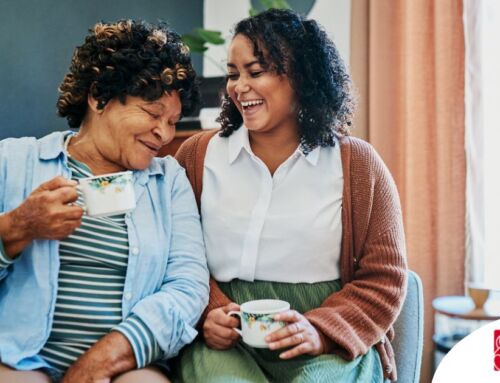How do we know when our aging parents need assistance? Many of us find ourselves suddenly immersed in the challenging role of caring for elderly parents or an elderly loved one. This substantial transition can be overwhelming, but with preparation and knowledge, we can become proactive caregivers.
So how do we prepare for this responsibility? The key lies in recognizing certain signs that indicate our aging loved ones may require assistance, such as home care services. It’s rare for elders to admit they need help, often due to their strong desire for independence or not realizing they need assistance. With this in mind, we’ve compiled a list of indicators that your aging parent may need help at home.
9 Signs Your Aging Parent Needs Assistance
Change in Housekeeping Standards
Has your parent’s regular housekeeping routine started to change or decline? This could signal a need for home aide services.
Deteriorating home cleanliness and maintenance can be signs that an aging parent needs help. If their living space becomes cluttered, dirty, or there are unusual odors in the house, it may suggest their inability or difficulty in keeping up with household chores or cleaning. This decline can indicate that they require help to maintain a safe and healthy living environment.
Financial Irregularities
Are bills being neglected? Are there issues with their primary banking accounts, like overdrafts or bounced checks? Changes in financial management abilities can be an important sign to consider. If an aging parent is struggling to pay bills on time, frequently has late or unpaid bills, or is making unusual or impulsive purchases, it may suggest cognitive decline or an inability to handle financial responsibilities. These changes can lead to financial difficulties and potential exploitation by others.
Changes to Eating Habits or Unexplained Weight Loss
Changes to eating habits and weight loss are crucial signs to monitor. Weight loss could indicate that your parent can no longer cook or shop independently. If an aging parent consistently complains about difficulty in grocery shopping, cooking meals, or lacks the motivation to eat, it may indicate their inability to manage their nutritional needs adequately. Weight loss may suggest that they are not getting adequate sustenance or that there may be an underlying health concern.
Unusual Bruises or Burns
Unexplained bruises could indicate falls or mobility issues. Burns may suggest difficulties with cooking.
Lack of proper nutrition can also contribute to increased bruising in the elderly. Nutrient deficiencies, particularly in vitamins C, K, and E, can weaken blood vessels and impair collagen production, which can result in more frequent bruising. It is essential for older adults to follow a balanced diet and consult with healthcare providers or nutritionists to ensure they are meeting their nutritional needs.
Declining Personal Hygiene
Changes in bathing, dressing, grooming, or toileting habits could be signs that your parent is struggling with these tasks. If they are neglecting basic grooming habits, skipping baths or showers, wearing soiled or unkempt clothing, or neglecting their dental hygiene, it may be a clear indication that they are struggling to take care of themselves without assistance.
Difficulty in Mobility
Do they struggle moving from room to room or performing tasks like walking out to the mailbox? Changes in physical mobility can also be a cause for concern. If you notice unsteady gait, difficulty walking or climbing stairs, or frequent falls or accidents, it may indicate that your aging parent needs assistance at home. Physical limitations can greatly impact their safety and everyday functioning, indicating the need for support.
Forgetfulness
Are appointments being forgotten? Are calls going unreturned or names of familiar people or objects being forgotten? If they frequently forget important dates, struggle to remember recent conversations or appointments, or experience difficulties in finding or misplacing items, it could be indicative of cognitive decline. These changes could make it challenging for them to manage their medications, navigate daily tasks, or maintain their own safety at home.
Signs of Isolation or Depression
An increase in sadness, withdrawal, or a lack of motivation could be a signal of depression. More consistent isolated and withdrawn behavior may also indicate that an aging parent needs assistance. Weakening social connections, canceling plans with friends or family, and choosing to stay at home excessively may suggest a lack of energy or willingness to engage with others. This isolation can lead to loneliness, depression, and may highlight the need for companionship or support at home.
Uncharacteristic Outbursts and Mood Swings
Changes in mood or behavior can be a significant sign that an aging parent needs assistance at home. Sudden verbal or physical outbursts could be signs of frustration or stress. Mood irregularities may manifest as increased irritability, mood swings, or uncharacteristic aggression. These changes could be due to physical discomfort, cognitive decline, or emotional distress, and may require the intervention of a healthcare professional or therapist to address the underlying issues.
Wrap Up
Recognizing the signs that an aging parent needs assistance at home is crucial to ensure their safety and well-being. Observing changes in personal hygiene, physical mobility, memory, eating habits, home cleanliness, social behavior, and financial management can provide valuable insights into their ability to manage daily activities independently.
By identifying these signs early, necessary steps can be taken to provide appropriate support and assistance to ensure the best possible quality of life for the aging parent. As a starting point, calling CareGivers of America can provide you some much needed direction and support.
~ ~ ~
For over 30 years, CareGivers of America has proven our leadership in the home health care industry while showing continuous dedication in referring the highest level of care. There is an alternative to nursing homes and assisted living facilities; Home Health Care. We serve families in the south Florida counties of Palm Beach, Broward, and Miami-Dade.
Do you have questions about how you can better support your loved one while they age in place in south Florida or regarding homecare in general? Please contact us here: Click here to contact us or call us toll free: 800-342-4197
Our amazing mailing list is where you’ll receive special content, click here to subscribe.
*No information in this article is to be taken as advice, medical or otherwise. This post is not sponsored, but may contain external links to websites, articles or product examples. External links are used for example or reference purposes only and these links do not indicate specific product or website endorsement by CareGivers of America.





